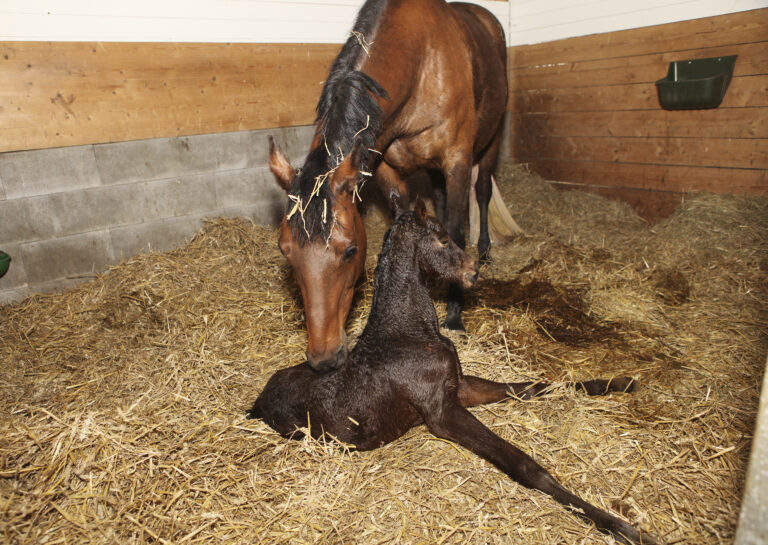
Many veterinarians are faced with horses that lose weight in the winter, but summer can also bring horses into your practice that are losing weight. We talk about equine weight loss in summer in this episode of the Disease Du Jour podcast.
“I live in Arizona, and it is 115 today,” said equine nutritionist Clair Thunes, PhD, who owns Clarity Equine Nutrition based in Gilbert, Arizona. “We do see horses losing weight in summer. I see more weight loss in Thoroughbreds and Warmbloods.
“I also notice that horses that are more sensitive to flies seem to be more prone to weight loss,” said Thunes.
She said that might be due to more movement while trying to avoid flies and the stress of fighting flies and mosquitoes.
“I’ve seen horses almost have colic-like symptoms because of mosquitoes,” Thunes added. “Those horses lose weight.”
She said recommending using fans, sprays and sheets to deter biting insects.
Thunes reminded that horses need to acquire the majority of their feed intake from forages. However, forages are digested through fermentation in the hind gut “and that creates heat,” she reminded.
“That’s great in the winter, but this ‘internal combustion engine’ causes heat in the summer, too!” stressed Thunes. “That can make them not want to eat.”
She recommended feeding fiber sources that are “more efficient” to feed in summer, especially if horses are backing off forage or are losing weight.
She recommended fiber sources such as beet pulp or soybean hulls that the horse can ferment more easily. “You get more calories, and the horse can digest them faster,” Thunes said.
If you are using fat (usually as an oil) to add calories, Thunes encouraged that veterinarians talk to horse owners about proper storage. “Heat and fat will not always work,” said Thunes, meaning oils can get rancid. “For example, flax seed oil is not very stable in heat. But stabilized rice bran oil is okay in hotter temperatures.”
“Look for feeds that are high-fat/high-fiber, so they are very easily digested ingredients that are higher in calories,” said Thunes.
She reminded that veterinarians need to encourage horse owners to feed a balanced diet so that horses are getting what is not found in the forage portion of their diets.
“Owners need to feed according to bag directions,” stressed Thunes. She said a veterinarian should ask the owner of a horse losing weight to show her/him how the horse is being fed. If an owner is trying to cut calories or costs by feeding a senior feed at half the recommended rate, then the horse isn’t getting its needed nutrients. “Then the horse might need a balancer,” she added.
She reminded vets that less-stemmy forage is easier to ferment in the hindgut. “Understand forage quality [for client horses] and know that one forage will take more fermenting than something that is stemmy,” Thunes said.
She also warned that some grasses are higher in sugars than others, so be cautious if a horse has metabolic issues.
But Thunes reminded veterinarians that not all horses are metabolic, so for those horses, starch isn’t an issue in feedstuffs. She noted that a lot of performance feeds are 20-25% starch/sugar and 8% fat, which is “reasonable” for a hard-working performance horse.
PPID
“Some senior metabolic/Cushing’s horses even on Prascend can struggle with weight loss,” said Thunes. She advised veterinarians to do bloodwork on these horses in the fall as there is a seasonal rise of ACTH in September/October. “Then all of the sudden the horse founders in late September.”
She said there is a lot of confusion in horse owners because they were told for years that they should not test for PPID in the fall. But the Equine Endocrinology Group has established fall testing guidelines.
(Editor’s note: We will be talking to Dr. Hal Schott about PPID in the August 11 episode of Disease Du Jour.)
“So, if a senior horse is losing weight, it might be that PPID is not controlled,” said Thunes.
Supplements
Trying to decide what a horse needs nutritionally if you are working to change its type of feed while maintaining its needed intake of vitamins and minerals can be tough.
Thunes noted that equine vets are at more of a disadvantage than their small animal counterparts when it comes to feed/food labels. She said while most small animal foods have ingredients listed on the bag in descending order of what is in the product, horse feeds don’t generally do that.
She recommends keeping an eye on Omega 3 when feeding oils as not all oils are created equally. She warned that oils higher in Omega 3 are usually more costly. Thunes noted that canola or soybean oils can provide some Omega 3 intake for a horse. But she reminded that “feeding oil from a grocery that has been refined for humans to remove color also has taken the ‘goodies’ of it. So you are just getting calories, not protein.”
Weighty Matter
Thunes encouraged all veterinarians to carry a digital luggage or fish scale in the practice vehicle. “It’s a $10 investment that is worth it,” said Thunes.
Veterinarians can teach owners how to weigh hay and discourage them to feed a “flake” as a serving. “They won’t weight hay every time, but when you get a new shipment of hay and weigh a few flakes to get an average, that can help,” said Thunes. “It is is determined that a horse needs 24 pounds of hay per day and you get a new batch of hay with smaller flakes or isn’t as densely packed, it will weigh differently.”
Dehydration
Thunes encourages veterinarians to check on the salt intake of each client’s horse in the summer. While she said having free-choice salt blocks is great, sometimes it isn’t enough in hot climates. “Horses can get dehydrated easily, then they don’t want to eat,” said Thunes. “It’s important horses eat forage, because it will make horses drink more. You can wet feed to get water in, or add 2 tablespoons of table salt per day to feed,” even if the horse isn’t standing around sweating or working hard. “If the horse is working hard and sweating, I like to give electrolytes to replace those lost in sweat,” she added.
Thunes encourages veterinarians to check on the salt intake of each client’s horse in the summer. While she said having free-choice salt blocks is great, sometimes it isn’t enough in hot climates. “Horses can get dehydrated easily, then they don’t want to eat,” said Thunes. “It’s important horses eat forage, because it will make horses drink more. You can wet feed to get water in, or add 2 tablespoons of table salt per day to feed,” even if the horse isn’t standing around sweating or working hard. “If the horse is working hard and sweating, I like to give electrolytes to replace those lost in sweat,” she added.
(Editor’s note: Veterinarians might recommended to clients that they listen to the EQUUS Farm Calls podcast for horse owners on dealing with heat and electrolyte use with Dr. Emily Schaefer of The Ohio State University that can be found here.)
About Dr. Thunes
Dr. Thunes is an equine nutritionist who owns Clarity Equine Nutrition based in Gilbert, Arizona. Dr. Thunes works as a consultant with veterinarians, horse owners and trainers globally to take the guesswork out of feeding horses, and she provides services to select companies. As a nutritionist, she works with all equids, from WEG competitors to miniature donkeys and everything in between. Born in England, she earned her undergraduate degree at Edinburgh University in Scotland, and her master’s and doctorate in nutrition at the University of California, Davis.








